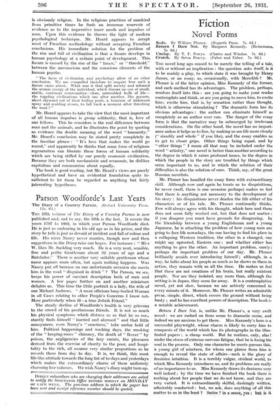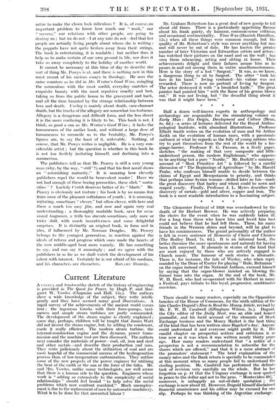Fiction
Novel Forms
Sado. By William Plomer. (Hogarth Press. 7s. 6d.)
THE novel long ago ceased to be merely the telling of a tale, with or without an implication : the question asks itself, is it to be mainly a play, to which state it was brought by Henry James, or an essay, as, occasionally, with Meredith ? Mr. Plomer is of the latter opinion, Miss Kennedy of the former, and each method has its advantages. The problem, perhaps, resolves itself into this : are you going to make your reader contemplate and think, or are you going to move him, to excite him; excite him, that is, by sensation rather than thought, which is otherwise stimulating ? The dramatic form has its obvious advantages : the author can eliminate himself as completely as an author ever can. The danger of the essay form is that the narrative may be submerged by irrelevant considerations. On the other hand, the novel has no import- ance unless it helps us to live, by making us see life more clearly (" steadily and whole " if you like), and the essay enables us to get to closer grips. Other things being equal, and by " other things " I mean all that may be included under the word artistry," one novel is better than another according to the degree in which it raises profound issues, to the degree in which the people in the story are troubled by things which seem important to us, and in which the solution of their difficulties is also the solution of ours. Think, say, of the great Russian novelists.
Mr. Plomer has handled the essay form with extraordinary skill. Although now and again he treats us to disquisitions, he never (well, there is one occasion perhaps) makes us feel that there is anything not necessary to the development of his story : his disquisitions never deaden the life either of his characters or of his tale. Mr. Plomer continually thinks. Few will always agree with his thought, which here and there does not seem fully worked out, but that does not matter : if you disagree you must have grounds for disagreeing. In the friendship between a young Englishman and a young Japanese, he is attacking the problem of how young men are going to face life nowadays, the one having to find his place in a collapsing Western tradition, the other in a changed, one might say uprooted, Eastern one ; and whether either has anything to give the other. An important problem, surely; perhaps the important problem of our day. Mr. Plomer brilliantly avoids ever introducing himself ; although, in a way, he talks about his people as much as he shows us them in action, they remain with us all the time. He makes us feel that these are not creations of his brain, but really existent people. Nor are they isolated, any more than, although the setting is in Japan, they seem far away. It is a contemplative novel, yet not slow, because we are actively concerned in every minute of it. Moreover, Mr. Plomer writes an admirable prose, simple, direct, which covers the ground without being hasty ; and he has excellent powers of description. The book h a notable achievement.
Return I Dare Not, is, unlike Mr. Plomer's, a very swift novel : we are rushed on from scene to dramatic scene, and indeed we are anxious to get there. Miss Kennedy's hero is a successful playwright, whose charm is likely to carry him to conquests of the world which has its photographs in the illus- trated papers ; a cheap world. But he realizes, only, alas ! under the stress of extreme nervous fatigue, that he is losing his soul in the process. Only one character he meets guesses this, a young girl of nineteen, for whom one glance from him is enough to reveal the state of affairs—such is the glory of feminine intuition. It is a terribly vulgar, strident world, to which Miss Kennedy introduces us, and its problems are really of no importance to us. Miss Kennedy draws its denizens very well indeed ; by the time we have finished the book there is nothing about her people that we do not know, and they are very varied. It is extraordinarily skilful, dashingly written, admirably conducted : but, we ask, does anything of all this matter to us in the least ? Satire ? in a sense, yes ; but is it
satire to make the clown look ridiculous ? It is, of course, an important problem to know how much our " work," our " success," our relations with other people, are going to destroy us ; but we do not—I at any rate do not—feel that her people are actually living 'people about whom she is writing : the puppets have not quite broken away from their strings. The book is entertaining, it is readable ; but neither does it help us to make certain of our own ground in life, nor does it take us away completely to the holiday of another world.
It cannot be necessary at this Iiine of day to describe the sort of thing Mr. Powys is at, and there is nothing new in this most recent of his curious essays in theology. He uses the saline counters as he did in Mr. Weston's Good Wine, mingling the miraculous with the most sordid, everyday snatches of exquisite beauty with the most repulsive cruelty and lust, taking us from the public house to the graveyard and back, and all the time haunted by the strange relationship between loi,e and death. Unclay is mainly about death, care-charmer death, but the tracks of the allegory are somewhat too tortuous. Allegory is a dangerous and difficult form, and the less direct it is the more confusing it is likely to be. This book is not, I think, so good a one as Mr. Weston's Good Wine ; it lacks the humaneness of the earlier book, and without a large dose of humaneness to reconcile us to the brutality, Mr. Powys's figures are, to say the least of it, unlovable. Nothing, of course, that Mr. Powys writes is negligible. He is a very con- siderable artist ; but the question is whether in this book he is :not too facilely imitating himself, and declining into a mannerism.
The publishers tell us that Mr. Peacey is still a very young man (why, by the way, " still"?), and that his first novel shows an " astonishing maturity." It is amazing how cleverly publishers repel the would-be benevolent reader ! Have we not had enough of these boring precocities, these slick " matu- rities " ? Luckily Crutch deserves better of its " blurb." Mr. Peacey is obviously not mature : his book is by no means free from some of the pleasant coltishness of youth ; it is amusing, irritating, sometimes " clever," but often clever, with here and there a much too easy jibe, and now and again very real understanding : a thoroughly readable book, save for occa- sional longueurs, a trifle too staccato sometimes, only once or twice dull, with much inventiveness and some delightful surprises. It is distinctly an original book, in form and in idea, if influenced by Mr. Norman Douglas.. Mr. Peacey belongs to the youngest generation, in reaction against the ideals of reform and progress which once made the hearts of the now middle-aged beat more warmly. He has something to say, and can say it amusingly ; and we agree with the publishers in so far as we shall watch the development of his talent with interest. Certainly he is not afraid of his medium, and his characters are characters. Boxasiv DOBREE.



































 Previous page
Previous page